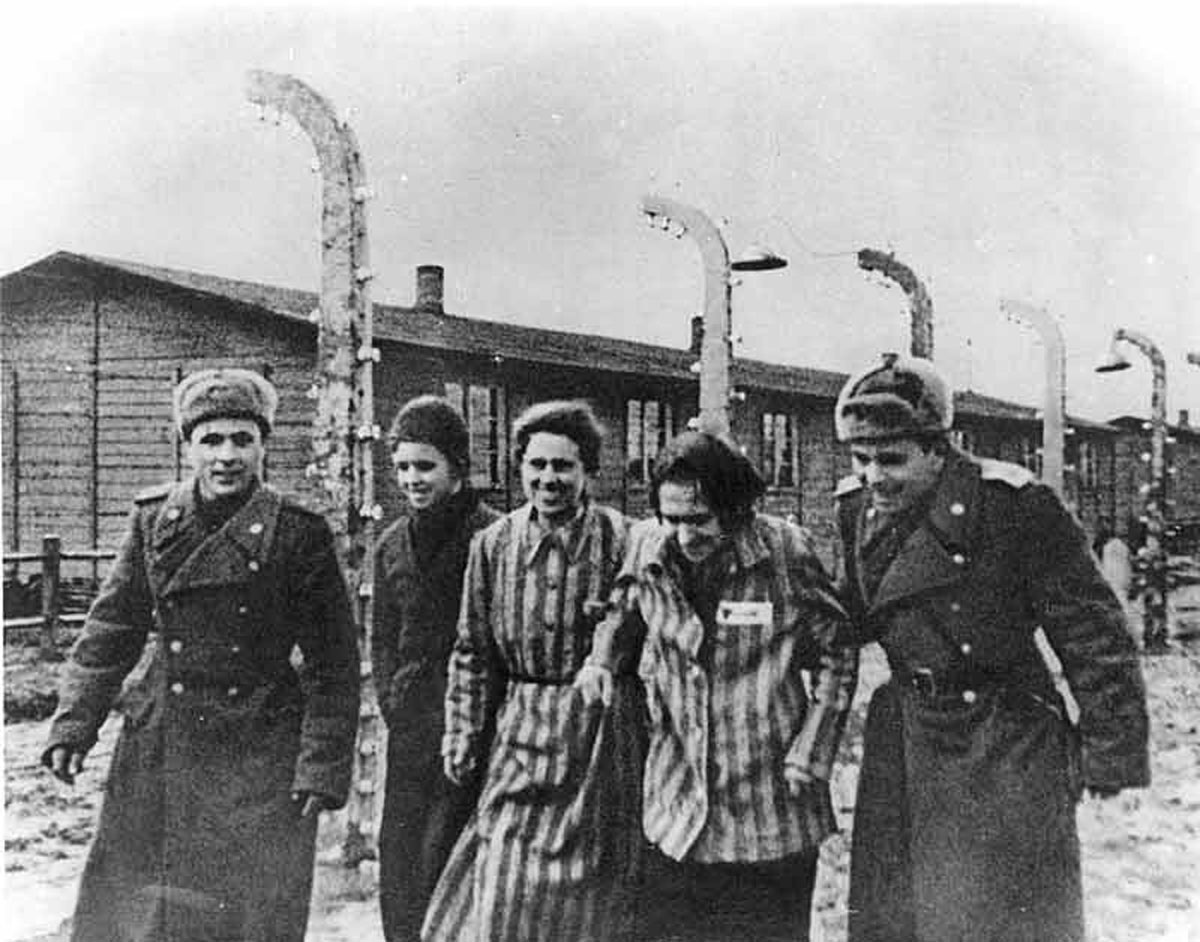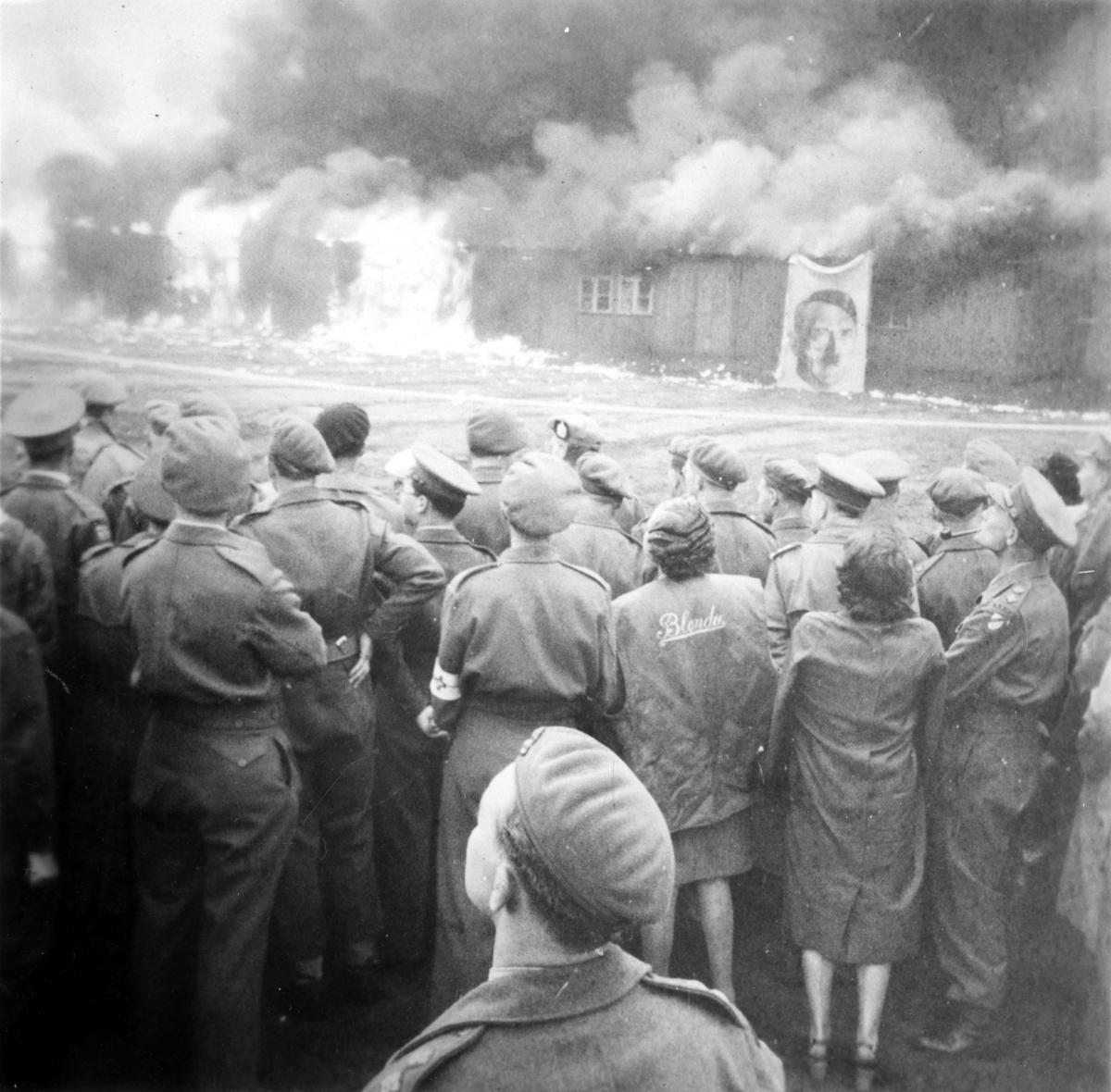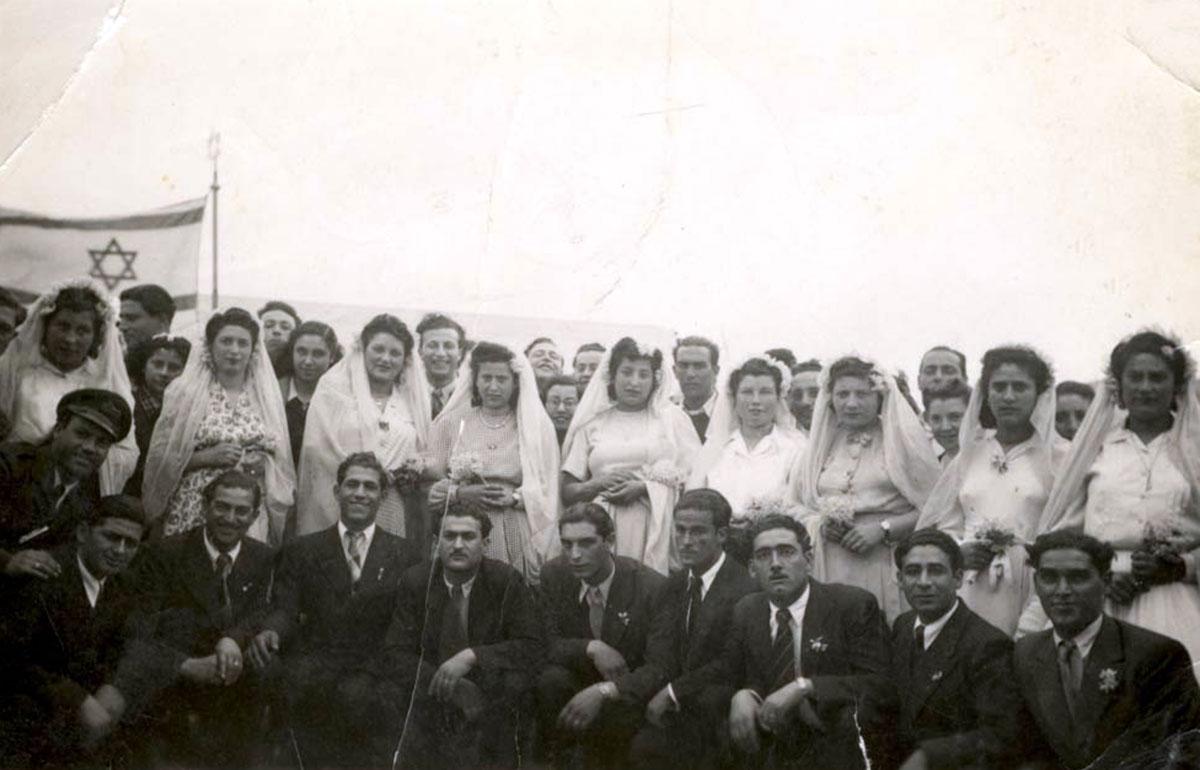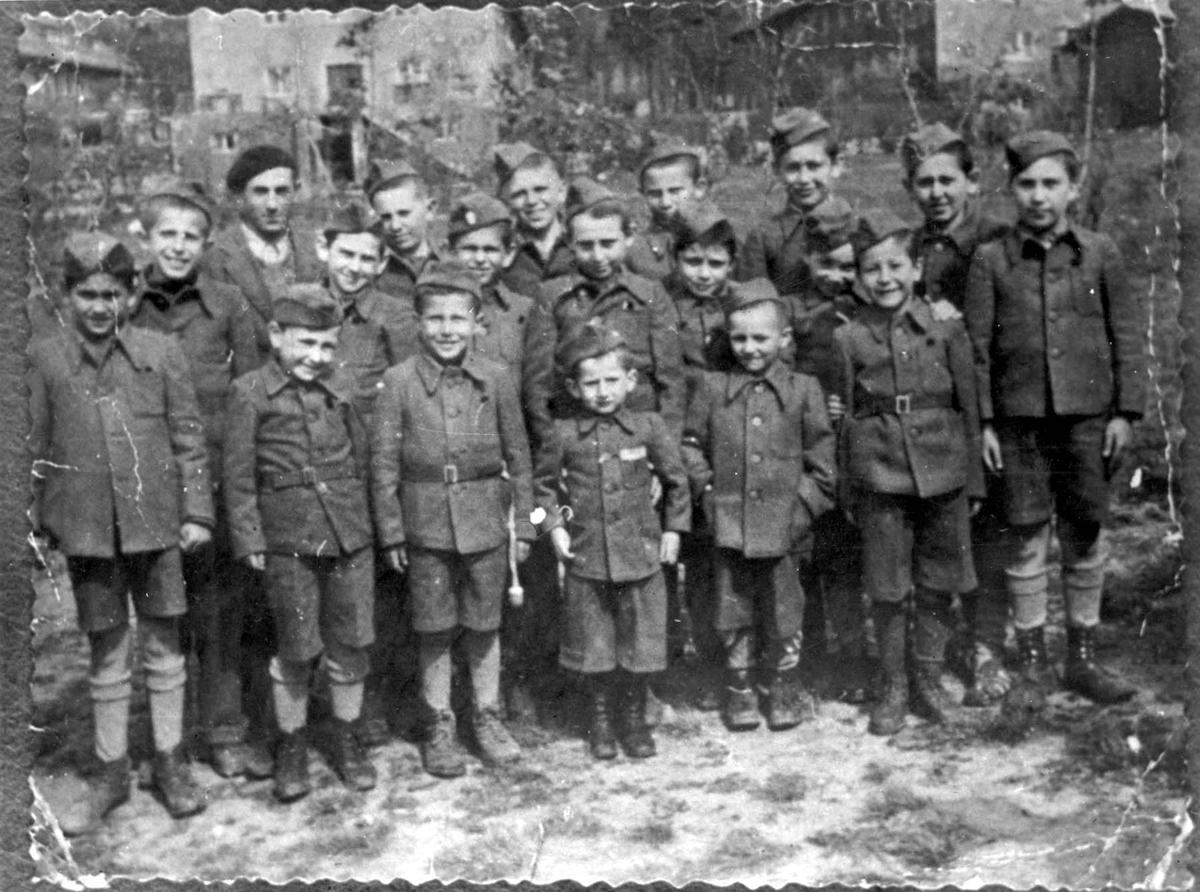Materials and Instructions
Materials needed for this ceremony: copies of passages to be read aloud distributed by the facilitator to the students. We recommend reading this ceremony using a narrator and two student readers; their parts are marked below. The texts titled "Student" are to be divided between the two readers. Solemn background music is appropriate. There are two notes in the ceremony to suggest changes in music to reflect the themes of the readings.
The Ceremony
Narrator:
On January 27, 1945, Soviet troops entered the Auschwitz-Birkenau extermination camp, the last extermination center still functioning under the Nazis. They found 7,650 survivors. Some one-and-a-half million people were murdered there, including 960,000 Jews.
Auschwitz-Birkenau has become the symbol of the Holocaust and of willful radical evil in our time.
What the liberators found in these camps astounded them. They came as soldiers, and left as liberators. They had been trained for combat, and most of them had barely even heard of these camps. Upon entering the camps the soldiers encountered thousands of starving people who had witnessed murder, torture, starvation, and had been dehumanized.
Colonel Lewis Weinstein remembers the first camp liberated by the US Army:
Student:
"We had heard all kinds of rumors and stories, but they were so horrible that they were indescribable; we just couldn't believe them. I had a great guilt feeling when I actually found out about what happened in these camps. I had talked in terms of possibly a few thousand having been murdered, but thinking in terms of six million... murdered – I was obviously very much taken aback."
Narrator:
Father Edward P. Doyle, who was a Chaplain in the American army, describes what he saw upon liberation of a Nazi concentration camp:
Student:
"I was there. I was present. I saw the sights. I will never forget [...] On that morning [...] I knew why I was there. I found the reason for it – man's inhumanity to man. What has happened to that beautiful commandment [...] the commandment of God to love one another?"
Narrator:
The following is taken from a series of poems written by Barbara Helfgott Hyett, who was inspired to write the poems based on testimony by the liberating soldiers:
The following poem should be read aloud by a student.
Our men cried.
We were a combat unit.
We'd been to
Anzio, to southern France,
Sicily, Salerno,
The Battle of the Bulge, and
We'd never, ever
Seen anything
Like this.
When we saw the ovens,
we were silent.
Not a word
Spoken, not
A single
Expression.
Not, Oh Jesus,
Not, what is
This? Not,
What have we done?
I don't know that
We were so angry
We were too numb
for that.
Narrator:
Shmuel Krakowski, a survivor of Auschwitz, was nineteen years old at the time of liberation. He recalls:
Student:
"I woke up that day, just as on the day before, and all the previous days – very, very hungry... I don't remember who was the first that morning to look out the window. I well remember his cry of joy: 'Boys, the Russians are here!' [...] We were liberated."
Design Suggestion
Here you may insert a musical piece with a theme of victory and/or freedom.
Narrator:
Nehama Baruchson-Kaufman, a Holocaust survivor, was a young woman in 1945 – twenty years old when she was liberated in Lublin, Poland. She recounts:
Student:
"I remember that I picked up a flower in the garden and gave it to the first Russian soldier I saw as a mark of appreciation for the liberation. We were so happy, and we thought: this is the start of a new life!"
Narrator:
After the extremely harsh conditions of the camp, the simplest pleasures seemed heaven-sent. Ephraim Poremba, twenty years old when liberated, describes his first time having a hot bath after liberation:
Student:
"We washed. They gave us soap. When did I last wash? I couldn't remember. Hot water... Whoever saw hot water? It was a dream. As much hot water as you want, to wash with soap, with soap! You could even wash your head, your body, it was heaven, it was heaven on earth!"
Narrator:
However, liberation was a bittersweet time for those who remained alive. As happy as they may have been to see the end of their harsh incarceration, too much of the survivors' world had been destroyed to truly rejoice.
Helen, who experienced life in Mauthausen, recalls:
Student:
"We saw a tank and an American soldier. He started screaming, 'You are free! Come out!' The strangest thing happened. There was no jubilation. A terrible sound of moaning sounded. Everybody was crying. They started thinking of those who did not make it to this moment."
Design Suggestion
At this point, the music should change to a somber mood.
Narrator:
Once the prisoners had been freed, the search for family members began. Many of those searching for loved ones were unsuccessful in finding any relatives.
Dov Frieberg, a survivor of Sobibor, realized that he was the only surviving member of his large family. He states:
Student:
"My eyes are riveted upon the expanse of destruction – does nothing really remain? Of all the masses, has not a person survived? Of my entire family, only I remain? How did it happen that all of them are dead and only I am alive?"
Narrator:
Yehoshua Buchler, who was only fifteen years old when he was liberated, describes his futile search for family members after liberation:
Student:
"...When I arrived in my town, I met a few relatives and there was great excitement. I asked, 'Where is father?' I was certain he was at home. 'We do not know where your father is.' 'What, isn't father at home?' ...Then I learned that no one had come back, that I was alone, that alone I had returned."
Narrator:
Shmuel Krakowski notes:
Student:
"Although we had seen a lot and experienced the worst, we still had hoped, still had dreamed. All those days we had struggled to survive, hour after hour, day after day, there had been no time to grasp the enormity of our tragedy. Now everything became clear. No longer were our families waiting for us; no homes to go back to."
Narrator:
Eva Braun, who survived Auschwitz and was liberated at Salzwedel, recalls:
Student:
"All through the war we had prayed for liberation, and here it was suddenly. You are free! When I heard about freedom, I was also very frightened... how did one behave in a normal world? We were frightened that we might not have anyone left in the world... Worry about the future weighed heavily on me. We had to build a future, but how does one build a future?"
Narrator:
How does one build a future? As they welcomed their freedom, all survivors grappled with this question. Many of the people who survived the Holocaust were able to rebuild their lives, create new families, and contribute to the societies of which they pecame a part. Despite the unfathomable loss and tragedy, they undertook the decision to "return to life."
By the end of 1945, many Jews decided not to return to their hometowns and villages, and preferred to remain in Displaced Persons' (DP) camps. These temporary DP camps were set up by the American army throughout Germany in order to provide a place to live for all those survivors who had nowhere to go. In DP camps, Jews did not wait for a permanent dwelling place in order to start over. They married and started families. They set up schools, published Jewish newspapers, established theaters and orchestras, and looked for ways to search for and commemorate their loved ones.
In this testimony, Eliezer Adler reflects on the three years he spent in DP camps:
Student:
"People got married; they would take a hut and divide it into ten tiny rooms for ten couples. The desire for life overcame everything – in spite of everything I am alive, and even living with intensity... After such a destruction to build a new life, to get married, to bring children into the world? In forgetfulness lay the ability to create a new life... somehow, the desire for life was so strong that it kept us alive..."
Narrator:
And yet, Primo Levi, a Holocaust survivor and well-known author, wrote a powerful admonition to the generations after Auschwitz against forgetting. One of his famous poems is called "Shema," which in Hebrew means to "listen." He implores his readers to hear what he is saying. In this section of his poem "Shema" he invokes the style of Hebrew prayer to request that the story of the Holocaust is repeated and never forgotten:
The following poem should be read aloud by a student.
Shema / Primo Levi
(…)
I commend these words to you.
Engrave them on your hearts
When you are in your house, when you walk on your way,
When you go to bed, when you rise.
Repeat them to your children.
Or may your house crumble
Disease render you powerless,
Your offspring avert their faces from you.
Narrator:
Although survivors had been liberated, they were not always emotionally and mentally free. Until this day, many of them find it difficult to live with their Holocaust memories.
Dr. Zalman Grinberg, who survived Dachau, spoke the following words at the first ceremony marking liberation from Nazism, in the summer of 1945:
Student:
"We... celebrate our liberation, but at the same time, it is a time for mourning for us. For every bright and joyful day at present and in the future is shadowed by tragic events of the past years... We are free now, but we don't know how to begin our free but unfortunate lives... We have forgotten how to laugh, we cannot cry anymore. We do not comprehend our freedom."
Narrator:
Erika Amariglio, a Holocaust survivor, describes how bearing testimony about her Holocaust experiences gives meaning to her life.
Student:
"Today I have seven grandchildren: Lior, Iris, Tomer and Omri, Charles, Erika, and David.
For my grandchildren and all the children of the world of any religion, I have written my testimony fifty years later so that they will be able to reply to anyone who dares to deny there was a Holocaust and so that they will always be on guard to make sure that there will never again be another Holocaust."
Narrator:
Let us conclude with a prayer that is as universal as it is timeless.
The following prayer should be read aloud by a student.
Must cruelty always be?
Must inhumanity ever be the signature of man?
No! No! We refuse to accept that!
We refuse to give hatred the last word
Because we know the power of love.
We refuse to believe that cruelty will prevail
Because we have felt the strength of kindness.
...
Where there is hatred, may we bring love.
Where there is pain, may we bring healing.
Where there is darkness, may we bring light.
Where there is despair may we bring hope.
Make this a better world, and begin with us.





















